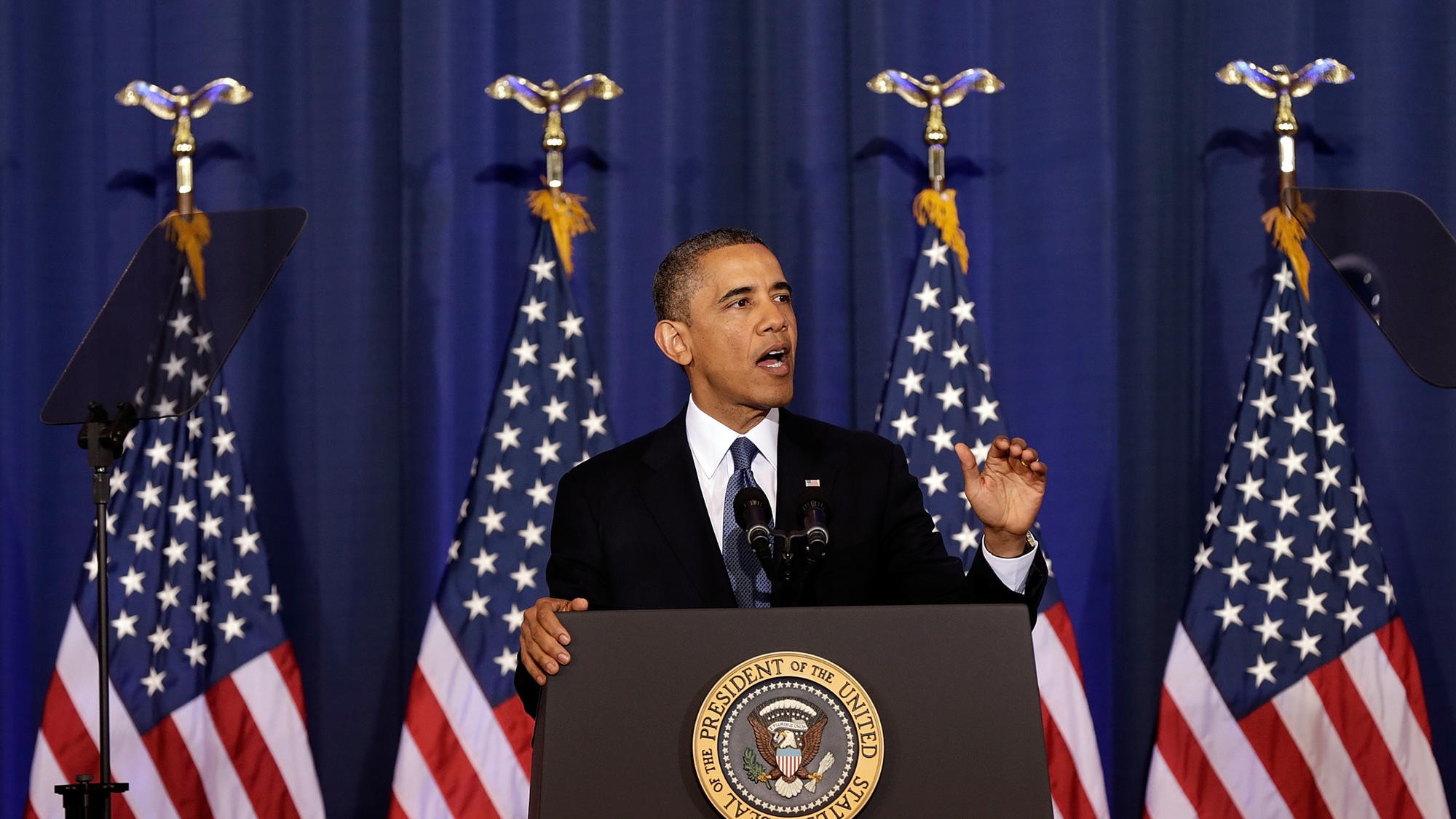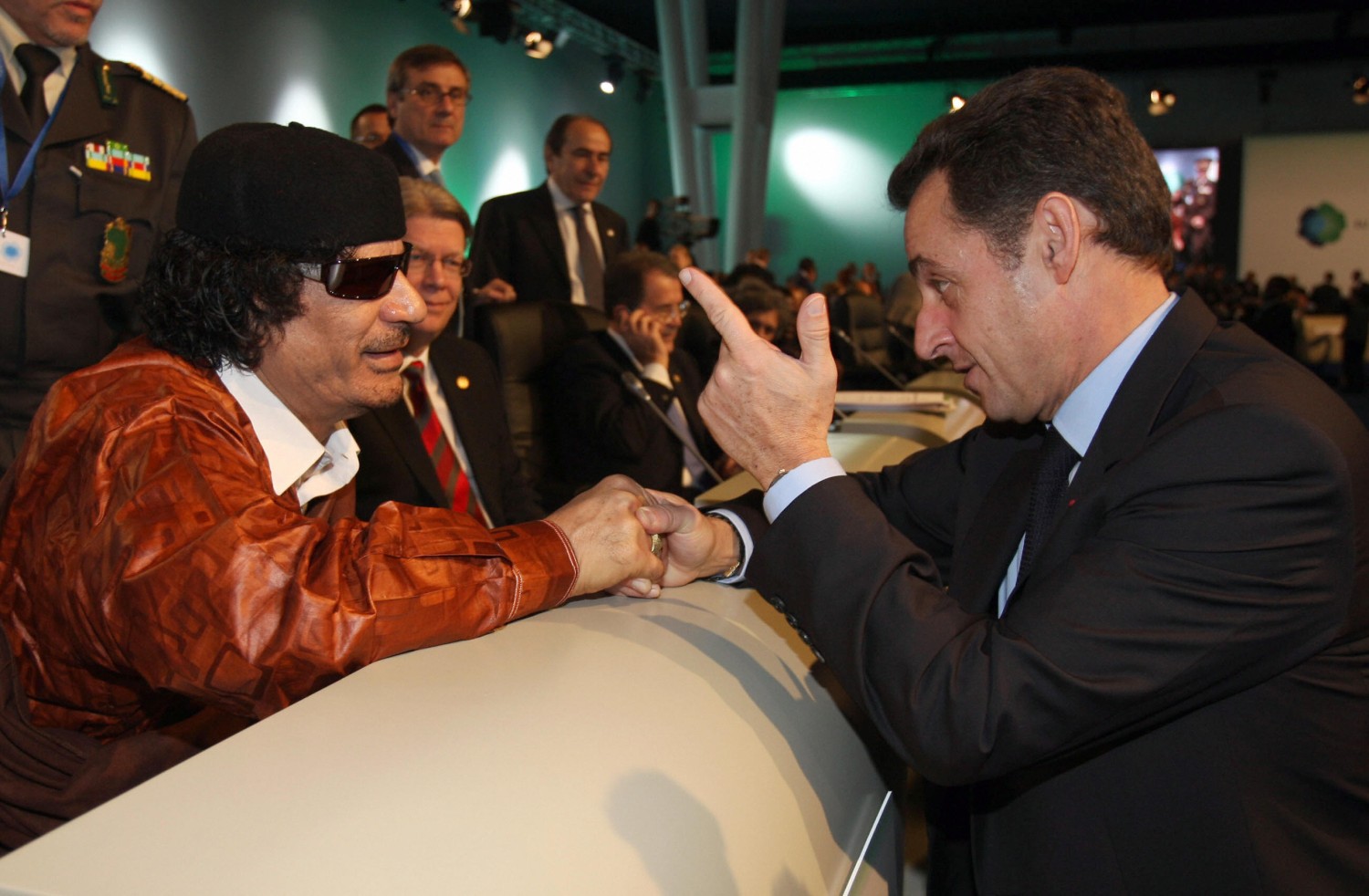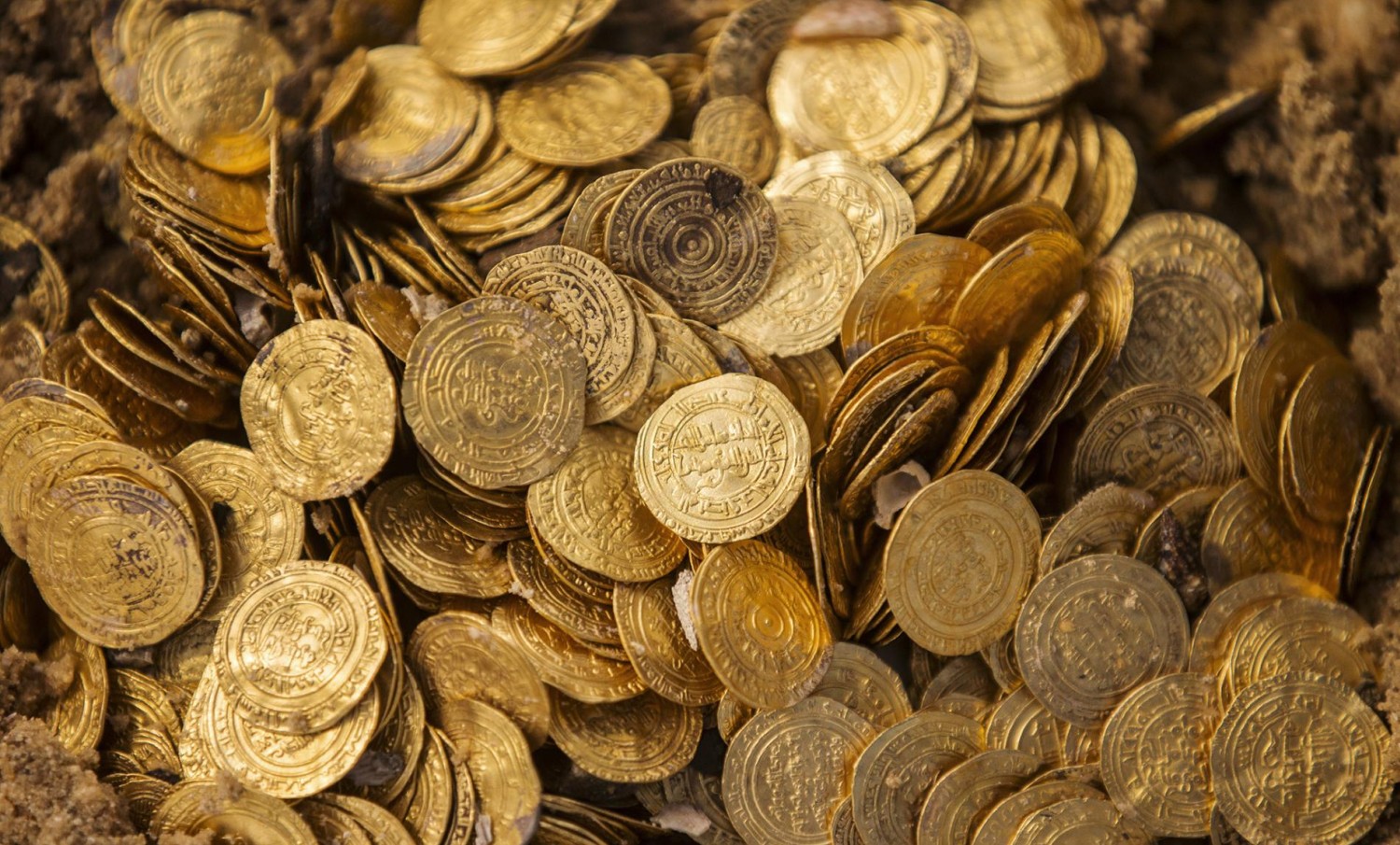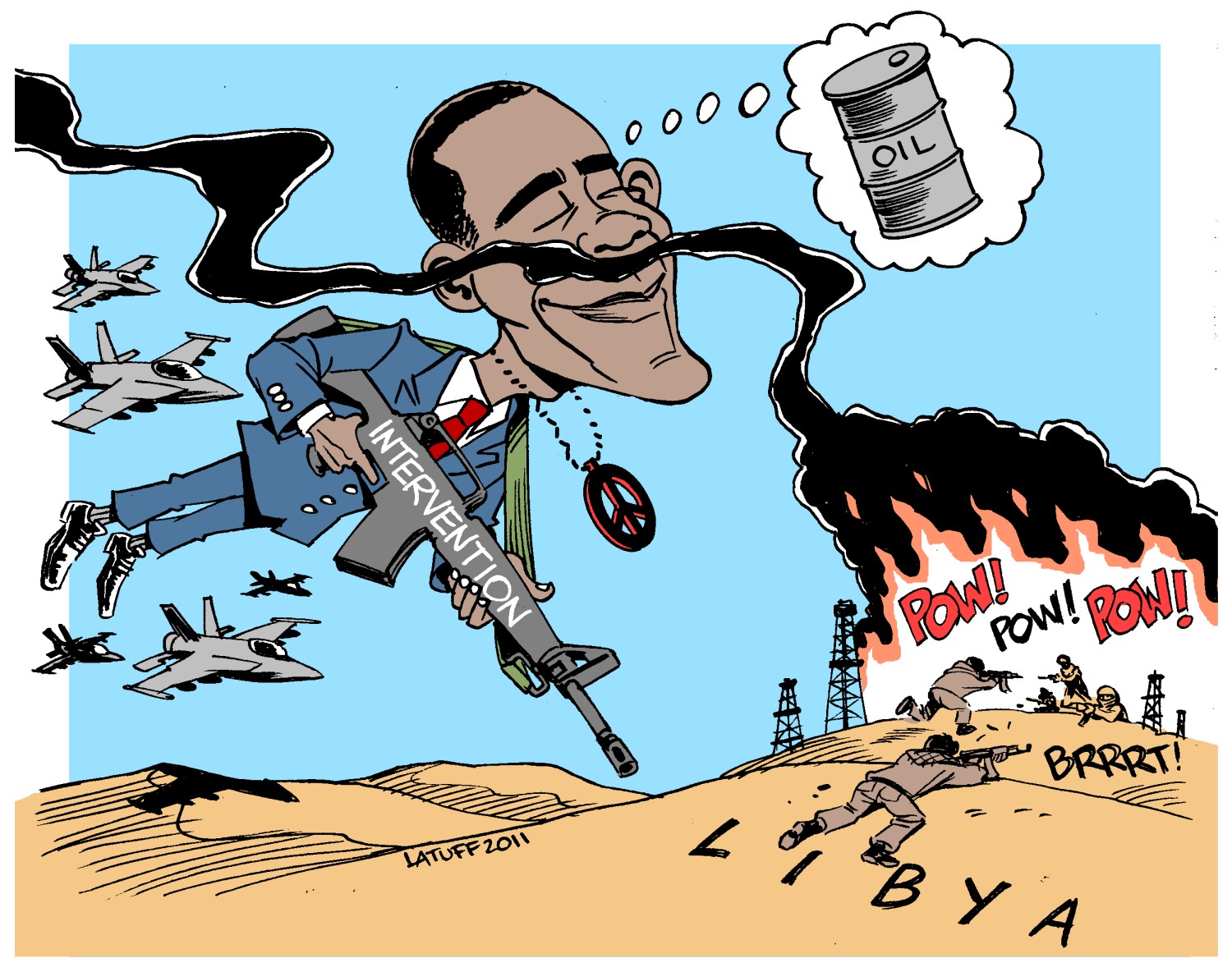Military Intervention in Libya
From friend to foe
For more than four decades, the Libyan people have been ruled by a tyrant -– Muammar Qaddafi. He has denied his people freedom, exploited their wealth, murdered opponents at home and abroad, and terrorized innocent people around the world.*
About two years before Obama's speech, at the 35th G8 summit in Italy in 2009, well within the "four decades", the same Barack Obama and his western friends posed for a family photo with this "tyrant"...
At that time Muammar Gaddafi was welcome and these western leaders had no problem posing with him on a photo. But that changed. France supported by the United States, the United Kingdom, NATO and other western friends started a military intervention in Libya in 2011 under the pretense of "humanitarian intervention". The UN Security Council approved a no-fly zone over Libya which was installed by NATO. Under the auspices of the United Nations Libya was bombed. Was it a "humanitarian intervention" or were there other more realistic motives for the western power elite to execute a regime change in Libya?
Oil reserves in Libya are the largest in Africa. Libya is a member of OPEC and one of the world's largest oil producers. Libya swims in "black gold" which is of course needed by the western elite and their industries. Around 2004 the following companies had a stake in Libya: Royal Dutch Shell, Woodside Energy, Repsol, Hellenic Petroleum, OMV, RWE Dea, ENI, Total, Petro-Canada, Conoco, Amerada Hess, Marathon Oil, Occidental Petroleum.* All companies from the western elite.
At a visit of "tyrant" Gaddafi to France in December 2007 French leader Sarkozy said:I am also here to fight at the side of French businesses and factories so that we have the contracts and orders that the others were so happy to have in our stead, without in any way renouncing my convictions on human rights.* An example of such a French company is Amesys which since 1 September 2011 is accused in an ongoing criminal case of complicity with human right abuses by the Gaddafi government in Libya by providing it surveillance equipment.*
In 2018 a corruption investigation into former French President Nicolas Sarkozy is opening a new window into little-known motivations in the NATO alliance that may have accelerated the rush to oust the Libyan dictator.* It was reported that Nicolas Sarkozy was placed under formal investigation on Wednesday in connection with a probe into allegations that the late Libyan dictator Muammer Gaddafi donated €50m in illicit funds to the former French president’s successful 2007 presidential run.
Instead of vaults in London, York or Switzerland, Libyan bullion is in the country held by its central bank, which is under Gaddafi's control. ... Libya's gold reserves, ranked No. 23 in the world, ahead of Saudi Arabia, as of December 2009, are worth around $6.5 billion at current prices...*
Libya was sitting on a huge pile of gold. And Gaddafi had big plans with it. At the African Union summit in Ethiopia in 2009 the BBC reported that Gaddafi ... envisages a single African military force, a single currency and a single passport for Africans to move freely around the continent. ... The summit's main agenda - to boost Africa's energy and transport networks.*
In 2011 WikiLeaks released a leaked e-mail from Sidney Blumenthal to Hilary Clinton...
Qaddafi's government holds 143 tons of gold, and a similar amount in silver. ... This gold was accumulated prior to the current rebellion and was intended to be used to establish a pan-African currency based on the Libyan golden Dinar. This plan was designed to provide the Francophone African Countries with an alternative to the French.franc (CFA). ... According to knowledgeable individuals this quantity of gold and silver is valued at more than $7 billion. French intelligence officers discovered this plan shortly after the current rebellion began, and this was one of the factors that influenced President Nicolas Sarkozy's decision to commit France to the attack on Libya.**
Gaddafi made plans to introduce gold for trading oil, a Libyan golden Dinar. This would have been a threat to dollar hegemony, the petrodollar, and the Euro.
Arguing that NATO's war is part of a larger process of militarizing U.S. relations with Africa—which sees the development of the Pentagon's AFRICOM as being in competition with Pan-African initiative—this account shows that Western relations with a "rehabilitated" Libya were shaky at best, mired in distrust, and exhibiting a preference for regime change.
Gaddafi wanted a United States of Africa which would threaten the United States Africa Command, USAFRICOM, by which the power elite of the United States control much of Africa. There were plenty motives for a regime change in Libya, but it had nothing to do with "humanitarian" reasons.
source
In the photo we see Hillary Clinton at the end of a one-day trip to Tripoli, Libya, on 18 October 2011, after the fall of Gaddafi. Looks like she's having fun and her initially secret plan worked out. If you click on the photo a video plays with a reaction of Hillary to the murder of Gaddafi. This tells a lot about the kind of people that lead the Anglo-American Empire. The Anglo-American elite always sell their aggressive wars and regime changes as "humanitarian interventions" to the world in order to make the ignorant sheeple think the best of them.
For generations, the United States of America has played a unique role as an anchor of global security and as an advocate for human freedom. Mindful of the risks and costs of military action, we are naturally reluctant to use force to solve the world’s many challenges. But when our interests and values are at stake, we have a responsibility to act. That’s what happened in Libya over the course of these last six weeks.*
"Inspiring" words from the "charming" chief liar of the United States. But the reality is that the United States and their western friends have no moral values, only interests.
On April 9, Condoleezza Rice delivered a talk in San Francisco. Or tried to. The former Secretary of State was interrupted repeatedly by cries from the audience of "war criminal" and "torturer". ... As one of the protesters was being taken away by security guards, Rice made the kind of statement that has now become standard for high American officials under such circumstances: "Aren't you glad this lady lives in a democracy where she can express her opinion?" She also threw in another line that's become de rigueur since the US overthrew Saddam Hussein, an argument that's used when all other arguments fail: "The children of Iraq are actually not living under Saddam Hussein, thank God." My response to such a line is this: If you went into surgery to correct a knee problem and the surgeon mistakenly amputated your entire leg, what would you think if someone then remarked to you how nice it was that "you actually no longer have a knee problem, thank God."*
The new post-Gaddafi state, far from coalescing into meaningful institutions, is becoming ever more fractured.*
Government authority is disintegrating in all parts of the country putting in doubt claims by American, British and French politicians that Nato's military action in Libya in 2011 was an outstanding example of a successful foreign military intervention which should be repeated in Syria.*
Comparing the Human Rights Watch World Reports for 2010 of for example Egypt, Algeria, Nigeria, Chad, Sudan, Eritrea, and Libya, then practically all of Africa was ripe for humanitarian intervention, but they picked Libya because Libya had something that the western power elite wanted.







